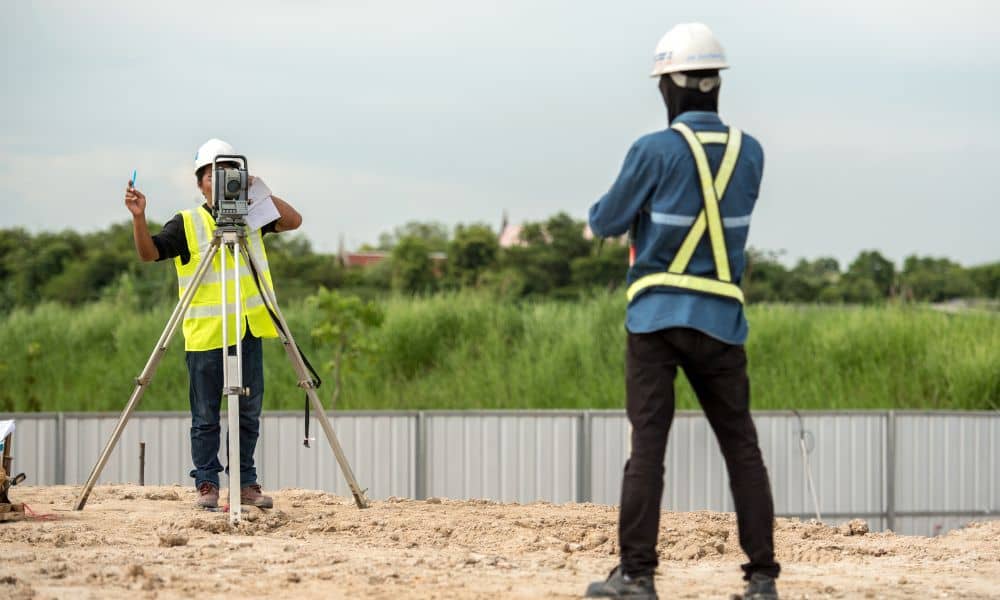
If you’ve ever waited weeks for your home closing and felt like the surveyor disappeared, you’re not alone. Many buyers, sellers, and real estate agents are asking the same question: “What’s taking so long with the boundary survey?”
A boundary survey might sound like a small step, but it can make or break a real estate deal. When it’s delayed, everyone—from the lender to the buyer—feels the impact. In Kansas City’s fast-paced property market, even a short delay can mean losing a buyer, missing a rate lock, or watching a deal fall apart.
So why are these delays happening, and what can be done about them?
The Growing Problem: Delays That Stall Closings
Across Kansas City, both homeowners and real estate agents are seeing the same issue—surveyors are overloaded. Conversations online and in local real estate groups show the frustration. Surveying firms are stretched thin after a busy summer of construction, and some are still catching up on older projects.
The result? A backlog that hits the housing market hard. Builders can’t pour foundations, lenders can’t close, and title companies can’t finalize without an accurate boundary survey. When that survey drags, the whole process slows down.
What’s Really Causing Boundary Survey Backlogs
Boundary surveys take coordination between several moving parts—surveyors, city offices, utility companies, and clients. When one step lags, the whole process does too.
1. Fewer crews for growing demand: Many local surveying firms have smaller field teams than before. A handful of large projects—such as road improvements and infrastructure upgrades—can tie up crews for weeks. Smaller residential jobs then wait in line.
2. Permits and utility coordination: Before starting, surveyors often need public records, permits, and utility clearances. Getting those approvals can take longer than expected, especially when departments are short-staffed.
3. Access to old records: Surveying depends on accurate plats, deeds, and historic records. When county offices or mapping systems run slowly—or when old plats aren’t digitized—surveyors have to wait to confirm details before heading to the field.
4. Technology interruptions: Even technology isn’t foolproof. Signal issues, equipment calibration, and network outages can all cause short delays that pile up over time.
5. Missing site information: Sometimes the problem starts with the property owner. Unmarked corners, locked gates, or missing documents can force surveyors to pause until they can safely access the site or verify data.
The Domino Effect on Kansas City Real Estate
A delayed boundary survey doesn’t just frustrate surveyors—it can derail an entire transaction.
- Lenders can’t finalize financing without it. If the delay lasts too long, a buyer’s interest rate lock might expire.
- Title companies hold off on insurance until property lines are confirmed.
- Buyers and sellers lose confidence, and some deals fall through completely.
- Realtors lose precious time and potential commissions.
- Surveyors burn out under pressure from back-to-back “urgent” jobs.
It’s a ripple effect that adds stress and costs to everyone involved.
What Surveyors Are Saying
Surveyors themselves aren’t ignoring the issue—they’re working overtime to meet demand. Many share that they’re handling full schedules, juggling multiple clients, and facing outdated systems or limited access to reliable data.
As one professional put it, “We’re not sitting still—every minute is booked. But clients often call a few days before closing asking for a rush job. That’s just not realistic.”
This highlights a key truth: surveying isn’t a quick task. Every line, corner, and measurement must be verified carefully. When surveyors rush, errors happen, and fixing them later costs everyone even more time and money.
How Buyers and Agents Can Avoid the 4-Week Wait

The good news is, many boundary survey delays can be avoided. It starts with early action and clear communication.
1. Order your survey early. As soon as you go under contract, request your boundary survey. Waiting until the last minute puts unnecessary pressure on the process.
2. Provide complete documents. Have your deed, prior plats, and any plans ready. The more information your surveyor has upfront, the faster they can start.
3. Work with local professionals. A licensed surveyor knows how to navigate local systems, coordinate with city departments, and anticipate potential holdups. That local knowledge saves days.
4. Communicate your closing date clearly. Don’t assume your surveyor knows your timeline. Let them know your target closing date from the start so they can schedule accordingly.
5. Ask about technology options. Some firms use drone mapping or faster digital processing tools to speed up surveys without cutting corners. Ask if your provider offers these options.
What Surveying Firms Can Do Better
This isn’t just a client problem—it’s an industry-wide challenge. Surveying companies can reduce backlogs by adapting their workflows:
- Offer smaller, faster services like property-line verifications or post-construction as-builts between large projects.
- Cross-train staff to handle office research and field prep simultaneously.
- Keep clients updated through progress emails or text alerts. A quick update can prevent unnecessary panic calls.
- Balance project loads so residential and commercial work stay on schedule.
These changes help surveyors maintain steady workloads while keeping clients informed and confident.
Helpful Tools for Kansas City Property Owners
If you’re planning a sale or purchase, a little preparation goes a long way. Before calling your surveyor:
- Check your county’s online property map or recorder’s portal for past plats.
- Locate visible property markers or flag potential obstructions like fences or retaining walls.
- Confirm that the property is accessible and free of hazards before the crew arrives.
These small steps make it easier for your surveyor to start immediately—without multiple site visits.
The Bottom Line
Boundary surveys don’t just confirm where your property begins—they keep deals moving. In Kansas City, where real estate timelines are tight and buyers compete fast, waiting four weeks for a survey can feel endless.
Most of the time, those delays aren’t about laziness. They’re the result of packed schedules, missing documents, and late communication. But with earlier planning, clear expectations, and collaboration between surveyors and clients, these problems can be avoided.
So if your deal is in motion, don’t wait until the last minute. Order your boundary survey as soon as the contract is signed, stay in touch with your surveyor, and be ready with your paperwork.
A little preparation can save you weeks of waiting—and might just save the deal itself.





